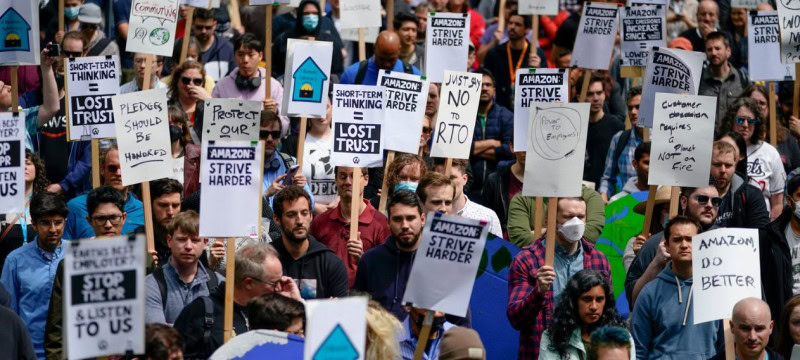At a Wednesday lunchtime rally at the company’s Seattle headquarters, hundreds of corporate Amazon employees urged bosses to “strive harder” as they denounced the company’s lack of advancement on climate objectives and an unfair return-to-office requirement.
The demonstration happened a week after Amazon’s annual shareholder meeting and a month after a new policy that required employees to work three days a week went into force. Before, team captains had complete control over how their members operated.
“Emissions climbing, time to act,” they yelled, as they expressed dissatisfaction with the pace of the company’s attempts to lessen its carbon footprint. They also pushed Amazon to give team leaders back control over work location.
Church Hindley, a quality assurance engineer, claimed that working from home enables him to live a better, healthier life while donning a red coat and a black pirate helmet.
Hindley stated, “I’m out here because I won’t just sit idly by as mandates are dictated from above down that don’t make sense and hurt the planet, hurt families, and hurt individual lives.” And merely to get us seated in the office so they can give us tax benefits.
Around 900 employees in Seattle were among the estimated more than 1,900 workers who had promised to strike as of Wednesday morning. While hundreds gathered at the Amazon Spheres, a four-story building in downtown Seattle that from the outside resembles three linked glass orbs, many participants took part virtually.
Eliza Pan, a former Amazon corporate employee and co-founder of Amazon Employees for Climate Justice, a climate change advocacy group founded by Amazon employees, said that today “looks like it might be the start of a new chapter in Amazon’s history.” Tech workers who were affected by the pandemic stood up and declared that they “still want a say in this company and the direction of this company.”
Amazon has a significant carbon footprint since it depends on fossil fuels to run the planes, trucks, and vans that transport items around the globe. Amazon employees have been outspoken in their criticism of the company’s methods.
Amazon stated its goals to deploy 100,000 electric delivery trucks by 2030 and to achieve net-zero carbon emissions by 2040 in its annual letter to investors. Activists contend that the firm must go farther and make a commitment to having zero emissions by 2030.
ALSO READ: Twitter is having financial difficulties as its current value is under $15 billion.
It will take time to complete, according to Brad Glasser, an Amazon representative. “While we would all like to get there tomorrow, for companies like ours who consume a lot of power and have very substantial transportation, packaging, and physical building assets, it’ll take time to accomplish,” he said.









